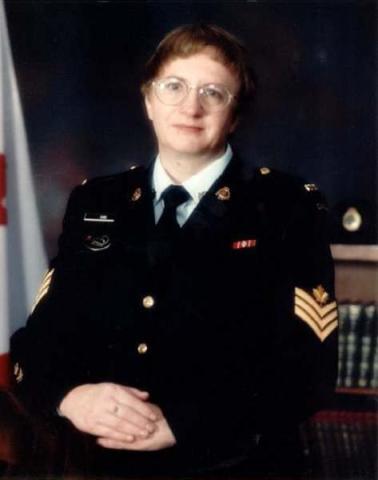
Joined
1974
Postings
- Borden, ON
- Gagetown, NB
- Victoria, BC
- Trenton, ON
- Valcartier, QC
- Ottawa, ON
As a small town girl about to graduate from high school in Campbell River, British Columbia, Donna E. King contemplated her options for the future. There were only two major employers in town: the logging company and Bell Canada. Considering the latter would only hire one person per family and one of her sisters already worked there, she had to look elsewhere for career options.
Inspired by her two grandfathers who had served in the First World War, and her own father who had served in the Second World War with the Naval Reserve, she applied to join the Canadian Armed Forces (CAF). As a teenager, King had already had a taste of the military. She had been part of the “Wrenettes” (Navy League Wrenette Corps), the female equivalent, at the time, of today’s mixed gender sea cadets.
King went for her basic training in January 1974 at Canadian Forces base (CFB) Cornwallis. Amongst the limited choices of trades available to women, she picked the administrative role.
Her first posting was at the aircraft maintenance engineering office at CFB Trenton. There, she married an ammunition technician she had previously met during her basic training in Cornwallis. She gave birth to their first child when the couple found themselves on their first posting together at CFB Borden in the late 1970s.
By 1985, King had already experienced three different bases. Living on base housing as the sole caretaker for her children while she and her husband were serving was a challenge. She reconsidered her career choice and decided to separate from her husband. “We’d been in Gagetown for a couple of years. My husband was quite often away as he deployed overseas and was out doing exercises. I felt like I wasn’t fitting in the military at that point, so I took a break from the service and from my husband. I moved back home to B.C.”
“That was probably my favourite posting. When the Coast Guard and the military worked together on a rescue, I’d be the one typing the reports.”
Unable to find employment in her field and finding herself missing the unique camaraderie of the CAF, King re-enrolled the following year. She was affected to the Rescue coordination centre in Victoria, BC, where she was eventually promoted to Master Corporal. “That was probably my favourite posting. When the Coast Guard and the military worked together on a rescue, I’d be the one typing the reports.”
King continued to fill different administrative roles in the CAF across different bases in Canada, until she was medically released, in 2004. Her postings were as varied as her career: 430 Helicopter Squadron clerk, instructor at the Canadian Forces School of Administration and Logistics and chief clerk of the Medical Services’ School, to name a few.
When reflecting on her 28-year career, King thinks about all the progress and changes she has witnessed. When she first joined in 1974, she was working from a typewriter. By her release, everyone had a computer. “When I look back, it was a whole different ballgame by the time I released from where I was when I started. They didn’t even have work boots that fit me back then. They had them special-made for me.”
She also looks back at how the mentality and roles changed for women in the military. “When I first started, women were considered ladies. We wore skirts, and we had to wear white gloves in the summer, winter gloves in the winter. We had these bowlers.”
“That’s when the perception of women in the military really changed. And I think also, it’s almost like you were expected to go from a lady to being a soldier, but most times, you didn’t really receive the right training in order to get there.”
In 1989, following a Canadian Human Rights Tribunal ruling, the CAF opened all occupations to women (with the exception of submarine service): “That’s when the perception of women in the military really changed. And I think also, it’s almost like you were expected to go from a lady to being a soldier, but most times, you didn’t really receive the right training in order to get there. When I went on my junior leader course, the mukluks they had were too big for me. I’d take one step forward and go three steps back. So the military has been slow to equip women for the jobs they wanted them to do.”
Since her release, King has been giving back to the community. She has volunteered in the past with the Canadian Cancer Society and recently started giving her time to the Canadian Walk for Veterans. She’s also involved with The Canadian Heroes Foundation to reunite lost medals with the right families.
With courage, integrity and loyalty, Donna E. King has left her mark. She is one of our Canadian Veterans. Discover more stories.